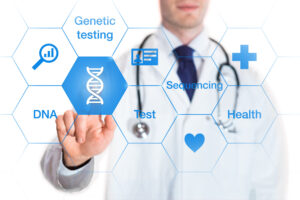Aging is a normal and complex process that all living things undergo, including humans. Genes also have a major influence on how we age, our environment, and our lifestyle choices. Understanding how genes influence aging can help us understand why some people age more gracefully than others, and how we can slow or prevent the development of age-related diseases.
1. How Genes Influence Aging
Genes play a major role in determining how we age. Our genes influence many biological processes that are important in aging, such as metabolism, cell repair, and our ability to respond to environmental stress. For example, some genes are responsible for maintaining the integrity of our DNA and repairing any damage. As we age, these repair mechanisms may not be as effective as they once were. This can lead to the accumulation of genetic mutations and accelerate the aging process.
2. Heredity and Longevity
Longevity, or the ability to live longer, is influenced by genes and the environment. Researchers studying the genetics of longevity have discovered many important genes associated with longevity. Some of these genes are involved in metabolism, immune system function, and cell repair. Apolipoprotein E (ApoE), a gene that contributes to lipid metabolism, has been linked to the risk of Alzheimer’s disease and longevity. People who carry certain types of the ApoE gene may live longer, healthier lives and have a lower chance of developing Alzheimer’s disease.
3. Genetic Influences on Age-Related Diseases
Genetic factors play a role in age-related diseases such as heart disease, cancer, and neurodegenerative diseases. Genes also play a major role in determining a person’s likelihood of developing these diseases, although lifestyle and environmental factors are also important. For example, changes in the BRCA1 and BRCA2 genes are known to increase the risk of breast and ovarian cancer. Similarly, changes in the DNA repair gene TP53 have been linked to various forms of cancer and aging.
4. Effects of DNA Breakage and Repair
As we age, several factors, including oxidative stress and environmental toxins, can compromise the integrity of our DNA. Genetic factors affect the functioning of DNA repair mechanisms, which is important for keeping cells healthy and preventing disease. DNA damage can be repaired by certain genes, and changes in these genes can affect the effectiveness of the repair process. When DNA repair capacity is reduced, mutations accumulate, accelerating aging and making age-related diseases more likely.
5. Epigenetics and Aging
Epigenetics is the study of changes in gene expression that do not occur at the level of DNA sequences. These changes can be caused by environmental factors and lifestyle, which can accelerate or slow the aging process. Epigenetic changes, such as DNA methylation and histone modifications, can affect how genes are expressed and how cells function. Research shows that epigenetic changes worsen with age. These changes affect many aspects of aging, including inflammation, metabolism, and cellular responses to stress. Understanding epigenetics can help you better understand how environmental factors affect our genes, causing us to age.
6. Genes and Healthy Aging
While genes influence how quickly we age, it’s important to remember that they’re not the only cause. Lifestyle choices, such as what we eat, how much we exercise, and how we manage stress, also have a major impact on how we age. A healthy lifestyle can help people with a genetic risk live longer, healthier lives and reduce their risk of developing diseases that come with age. For example, people who are genetically more susceptible to heart disease may benefit from a healthy diet and regular exercise.
7. The Future of Genetic Research in Aging
Genetic research into aging is changing rapidly, with discoveries being made all the time. Researchers are learning more about the genetic factors that influence aging. This could lead to new ways to extend life and improve later life. Personalized medicine, which changes medical care based on an individual’s genetic profile, could be important in future aging research. By combining genetic information with information about lifestyle and environment, we can develop better plans to help people age healthily and combat the diseases that come with aging.
Conclusion
Genetics is a major part of how we age. They affect everything from how long we live to our likelihood of developing age-related diseases. Genetics is a major factor in why we age and how we slow its effects, but they are not the only important factor. The environment and our lifestyle also have a significant impact on how we age and how we stay healthy and active as we get older. Understanding how genetics and other factors interact can help us better understand how to promote healthy aging and improve our overall quality of life.
FAQs
1. What role do genes play in how quickly people age?
Genetics influence aging by altering many biological processes, including metabolism, the body’s response to stress, and cell repair. Some people have genetic differences that help their cells repair damage or better protect themselves from oxidative stress, slowing the aging process. Genetic factors, on the other hand, can cause you to age faster by reducing your body’s ability to repair and maintain itself.
2. Can genetic testing tell me how long I have left to live?
Genetic testing can tell you how likely you are to develop certain diseases and conditions that come with age, but it cannot determine how long you will live. Genetics, lifestyle choices, and environmental factors all affect a person’s lifespan. Genetic testing can identify potential risks, but it cannot determine how long a person will live.
3. What are the common genes associated with longevity?
Genes that help cells repair themselves, keep the immune system functioning, and promote metabolism are all linked to longevity. The FOXO3 gene is associated with longer lifespans and a lower risk of age-related diseases. In contrast, the APOE gene affects lipid metabolism and is associated with a higher risk of Alzheimer’s disease.
4. How does DNA damage lead to aging?
Over time, factors such as oxidative stress, environmental toxins, and normal cell function cause DNA damage to accumulate. As DNA damage accumulates, it can cause mutations and problems with the way cells work, accelerating aging and increasing the risk of age-related diseases. As we age, our bodies become less able to repair DNA damage, which can make these effects worse.
5. What role does epigenetics play in the aging process?
Changes in gene expression that do not alter the DNA sequence are part of epigenetics. These changes are a major part of aging and can be caused by your environment and lifestyle. Epigenetic changes, such as DNA methylation and histone modifications, can alter the way genes are expressed and help explain why cells and health change with age.




